- Home
- James David Victor
Invasion- Proxima Page 7
Invasion- Proxima Read online
Page 7
And while Brigadier General Asquew was offering them a chance at revenge, it was also clear that she did not expect anyone who went to ever come back alive.
Solomon’s realization that this was a suicide mission fully resolved when he heard the next thing fall from the general’s lips.
“And because of your outstanding acts of bravery in the field this day…” She cleared her throat. “I will be recommending that the Outcast company be given full Marine status within the Rapid Response Fleet and the wider Marine Corps, and those of you who have won specialisms will be carrying them forward into your new rank, as well.”
There was a stunned moment of silence, and then loud cheers broke out from the room.
“Welcome to the Marine Corps, my brothers and sisters.” Asquew smiled grimly.
12
Ceremony
The atmosphere was hushed and still inside one of the holds of the Marine Corps battleship, the Oregon.
Solomon stood in line with the other survivors of Ganymede, looking into the large room that had been cleared of ammunition boxes and crates, and instead held assembled lines of standing full Marines, dressed in full power armor, on either side of them, creating an empty avenue that started in front of Solomon to the far end of the hold where, under the large airlock doors, stood Warden Coates, Doctor Palinov, and Colonel Faraday of the Oregon, an older man with graying hair and a craggy face in ceremonial dress uniform.
Solomon recognized him, having seen him about the Oregon. This was his boat, and he reported directly to the general. In this place at least, Colonel Faraday outranked everyone else.
“Brothers and sisters,” the colonel said in a loud, authoritative voice. “You are called here today to witness the induction not only of brave men and women into our community of Marines, but also to see the creation of a new company in the Rapid Response Fleet.” Faraday held up a hand to signal for a large banner to ripple open from the ceiling of the hold.
It was a skull, Solomon saw with a morbid shiver. A green skull over a red backdrop.
“The green represents new life, coming from the old way of death,” Faraday stated. “And of course, the red is the fire of courage and the color of bloodshed, both signifying where you have all come from and what qualities you will need to succeed as a full Marine.” Faraday nodded. “The Outcast Company is born,” he said in an almost reverential tone, before nodding to his fellow officer beside him.
“Step forward, Adjunct-Marine,” Warden Coates said in a low voice that nonetheless carried well over the silence. Coates had managed to somehow find a matching ceremonial suit for his position—gray with red stripes, with a small peaked cap emblazoned with a gold star.
The room was dark apart from the spotlights on the empty avenue, clearly illuminating Solomon Cready as he stepped forward in a formal ceremonial march—knees up, wide steps, slowing to bring both feet together, then performing once again as he moved slowly towards his superior officers.
“A-TEN-Hut!” the warden barked in perfectly aggressive, clipped tones, and Solomon stopped, stamped his right foot down, and threw a salute at the same time as the warden, and for the Colonel Faraday to acknowledge him with a more relaxed salute.
“Step forward, Specialist Commander Cready.” Faraday nodded, and Solomon took the final two steps that put him in front of the men and women.
This is it, Solomon thought. This is my graduation.
For a moment, time seemed to slow down as Solomon considered his position and his past. He had never even dreamed that he would be standing here, in front of a military leader and being awarded full Marine status. Even after joining the Outcast Marines, he had found it difficult to imagine that he would ever actually make it through basic training and then field training to this point.
But here we are, he thought. He had done it.
The old Solomon that he had been—the one who had scammed the Yakuza and the Triads, and who had stolen from corporations and museums alike—would have scoffed at this ceremony. He would have sneered at such ritual antics.
What’s the point? When are they going to pay me? That’s what I want to know! Solomon could almost hear his previous self saying just that in the back of his mind.
‘But now I am older, I put away childish things…’ the ex-thief remembered a line from somewhere, though he couldn’t remember where. But it was true, and it made sense to him now. The old Solomon that he had been hadn’t seen what this new Solomon had seen. He hadn’t spilled blood and sweat beside his military brothers and sisters, even those he had hated.
Solomon felt like a new man, which was itself an unusual sensation for someone who had always been so certain of his place in the world. The old Solomon had been a loner, a wild card—he had even turned on his oldest friend Matthias Sozer, hadn’t he?
But now I know something different… Solomon had the humility to lower his eyes for a second, to look at his feet on the grillwork of the hold’s floor.
Now, Solomon knew that he was nothing without his team. The Outcasts had been forged in battle, and when Solomon had walked out of it, he felt himself to be unrecognizable. There was no going back to the man that he had been.
“Specialist Commander Cready,” the colonel said in a gravelly voice, sounding very serious indeed. “I have been empowered as the site-commander to induct you into the Marine Corps, but first I have to ask you one question: are you ready for this duty?”
Solomon breathed, allowing himself to savor the moment. It was a duty, of course. He would be expected to take orders for the Confederacy. To kill for the Confederacy. To die for the Confederacy, if need be.
Of course, he had been expected to do all of these things as an adjunct-Marine of Ganymede before as well, but the Outcasts had been pressganged convicts, implanted with control chips that the warden could use to paralyze them at any given opportunity. I never really had a choice to join the Marine Corps before, Solomon knew. The only other option would be to be sent to Titan as a laboring prisoner for the rest of his natural life, which had been sure to be very short, given the harsh conditions and the dangerous nature of ice mining.
I’ve never really been asked before, Solomon thought.
You think you can say no? the argumentative and difficult small part of his mind said—the part that belonged to his old self, and not his new. The old Solomon would have called the new one a fool and that he could still be sent off to Titan at the whim of his superior officers, and that he still had the control chip implanted into his neck anyway, didn’t he?
But this time, it was different, Solomon told himself. He had been asked, at least. He had been seen and recognized, and even respected, by his superior officers.
“I am, Colonel, sir.” Solomon nodded.
The first thing to go was his light tactical suit.
Two Marines stepped forward from either side of him to start working quickly and efficiently to strip the Gold Squad Commander of his shoulder-pads, gauntlets, and battle harness that they had all been instructed to wear. In one of those slightly comical twists, Solomon and the others were already barefoot, as the Marine Corps had long since found out that this ceremony took too long if you also had to disengage metal boots as well.
In just a short while, Solomon stood before Warden Coates and Colonel Faraday in just his undermesh suit, as the two Marine helpers returned with his new dress.
First went on the mesh gloves, black, of course, and much thinner and made of finer materials than any that the adjunct-Marines had worn. They had pressure-sensitive pads on the fingers, and sensors embedded just above the wrist that would communicate his heartrate, blood pressure, moisture retention, and a number of other essential biological readings to his new uniform.
And the backs of the gloves were carefully machine-embroidered with the sword, star, and eagle insignia of the Marine Corps.
Next came the mantle—a flexible padded collar studded with sensors that draped over his shoulders and covered most of his neck. It w
ould offer some more protection from attacks, but its primary purpose was to generate passive energy from the heat of his body and transmit it to the much more powerful power suit he was soon to wear.
“Arms up,” one of the Marines said, and Solomon did so for a wide metal belt studded with connector ports and module holders to be clipped around his waist. In the center was a large metal buckle with the Marine Corps insignia emblazoned for all to see. The belt harness functioned like the old battle harness did, Solomon realized as he carefully watched the procedure. He would have to suit up in the worst conditions ahead, he was sure. Metal-mesh straps were extended from the belt to cinch onto the mantle and cross his thighs, supporting his body and adjusting his posture. It was a surprisingly comfortable design and felt much lighter than it looked.
Next came the shield plates—a breastplate and a back plate made of interlocking sheaths of metal that could move and flex, hooking up to the belt harness for green LED lights to flash that they had achieved connection and the armor was now powering up.
Power armor was mechanistically the same stuff as Solomon’s old shoulder-pads, power gauntlets, and power boots, but it was made of thicker materials, with more cushioning material between alternating plates of metal, metal wire, and mesh materials. Ultra-fine cables that moved water and liquid oxygen around his body in both a coolant and hydration system snaked through the underside of the plates, along with fine threading of connectors that meant that the suit could be ‘powered.’ It could generate its own electricity from light or heat, and its tiny servo mechanisms, pistons, and compressors meant that Solomon would feel only a fraction of the weight of all that metal.
Over the shield plated went the shoulder-pads, magnetically clicking into place, and finally came the plates greaves, the power gauntlets, and the power boots.
By the time they had finished, Solomon Cready now stood five inches taller from the heavy boots, and a good few inches wider as well.
And yet it still feels remarkably agile. Solomon tried swiveling his hips, to hear the tiny hum and whirr of internal motors from his new suit.
“Marine,” one of the helpers murmured, snapping Solomon’s focus back to the moment, where a helmet was being lowered over his head, connecting to the mantle and with an automated hiss, inflating a snug rubber seal with the shield plates.
Solomon was plunged into darkness for the briefest moment, but then a friendly digital-green light washed over his face, and Solomon was looking out of the helmet’s faceplate, with the holographic display of the power armor’s commands and readouts scrolling down one side of his vision.
In front of him stood Colonel Faraday and Warden Coates, and somehow, the bullet-proof crystal lenses of the helmet seemed to make the figures appear clearer than even Solomon’s natural eyesight would have allowed.
POWER ARMOR… Active.
USER ID: 1LT Cready.
COMPANY: Outcasts, Rapid Response Fleet.
SQUAD IDENTIFIER: Gold.
SQUAD TELEMETRIES… Active.
Bio-Signatures: GOOD.
Atmospheric Seals: GOOD.
Chemical, Biological, Radiological Sensors: ACTIVE
Oxygen Tanks: FULL (6hrs).
Oxygen Recycle System: WORKING (1hr).
The power armor had better sensors and better protection than the light tacticals had, Solomon saw. There was even a hazy green wash of color every few seconds, as the suit’s internal scanners registered the assembled lifeforms of the Marines all around him.
It’s like wearing a top-of-the-range battleship, Solomon thought in awe.
“You are clothed anew, Marine,” Faraday’s voice came over the suit’s internal speakers loud and clear. “But there is still something that we have to take away from you…”
Solomon watched as the older man gestured for his old shoulder-pad to be brought toward him and held in the hands of the Marine as Faraday reached down with a small handheld device, and there was a fizz of steam and escaping gas as he plucked something from the top edge.
It was Solomon’s specialist commander star—a tiny golden star that had been magnet-sealed to his old suit.
“You no longer need this, solider.” Faraday gestured for Solomon to open his gauntleted hand, and he dropped the tiny bronze star into his hand with a chink. Solomon felt a moment of sadness at that, but he promised himself that he would keep it. He would never throw away the first symbol he had that others had trusted him.
“But instead, we give you this.” Faraday held up a hand, and one of the Marine helpers placed into it a small black metal box, which flipped open in the man’s hands and revealed a small foam bed, with a slightly larger gold-looking star over a sword. The insignia of a first lieutenant, over the sword of the Marine Corps.
And if I survive long enough, I’ll add another sword under that first one, and then a third, and then… Solomon almost shook his head, inwardly laughing at his own enthusiasm. After the star and four swords came the silver eagle over a star, the insignia of a colonel of the Marine Corps and probably the highest ever practical “field rank” that a man like Solomon knew he could ever hope to achieve.
After that comes the generals, he knew. Officer classes like Colonel Faraday here probably required extensive re-training at some elite Marine Corps academy somewhere…
FZZT! Using the same tool, the colonel sealed Solomon’s new rank onto the upper dome of his new right shoulder-pad.
“Welcome to the Marine Corps, First Lieutenant Cready.” Faraday nodded. “Although you have the same duty as before, to command your Gold Squad in times of battle, you are also now empowered to command squads of full Marines in times of battle, both those of your own named color squad, and those of others.” Faraday raised an empty hand once again.
“Bring forth the flag,” he intoned, and one of the Marine helpers disappeared behind him to return with a folded triangle of what looked to be a very ancient material in red and white.
“Place your hand on the flag, Lieutenant, and repeat after me the Marine Oath…” Faraday said, and Solomon did so.
“Through blood and fire, I will still stand strong.
“I will stand at the borders and the crossroads, I will stand strong.
“Even with the eternal night before me, I will be the flame!”
As the words died in Solomon’s throat, he found himself looking at Colonel Faraday for a short moment, and then across to Warden Coates to see the man give him the tiniest nod of recognition. It was a small act, but Solomon felt as if it was titanic. Does this mean that Warden Coates respects me now? That he won’t work to have me banished and exiled anymore?
With his head still reeling from the ceremony, Solomon was dismissed, walking lightly on a suit that aided and supported every movement of his battle-hardened body back to the line, as the next adjunct was called up to be stripped of their old self and transformed.
By the end of the ceremony, every one of them would be made anew.
13
You won’t be Coming Back
Mission ID: PROXIMA
Strike Group ID: Outcasts Company, Rapid Response Fleet
Parent Fleet ID: Rapid Response 2, Confederate Marine Corps.
Squad Commander: Cready (Gold)
GROUP-WIDE ORDERS:
Select weapons module components
Make planetfall
Await activation order
Isolate target (NeuroTech HQ)
Eliminate target’s ability to produce Ru’at technology
The commands flickered over the inside of Solomon’s helmet as he sat in the webbing seat of the Oregon, in the same hold as he had been inducted into the Marines in, funnily enough.
But the last sixteen hours had seen the hold and the Oregon itself transform from an emergency rescue vehicle to a battle-ready strike command. The banners and crates had been cleared away and replaced by the webbing seats and the racks of weaponry that each Marine would be expected to carry.
Service knife.
&
nbsp; Small service pistol.
Solomon ran down his inventory on his internal holo-controls, activated by simple hand gestures on the sensor pads on his mesh gloves inside their gauntlets.
6 meters micro-rope—an ultra-fine coiled cable of metal wires that would be strong enough to hold him and two other Marines, securely wound from its deployment port inside his belt harness. This matched the piton attachments that he could kick out from his heel and toecap of the boot, should he have to do any climbing.
The power armor that they now wore was incredible, Solomon and the other Outcasts had marveled. They were fitted with a variety of equipment, suitable to a wide variety of terrains and challenges that they might face.
A standard medical kit was in place inside its modular compartment on his belt, complete with wound sprays, bandages, surgical kit, and fixatives. No medicines in the module, however, as the suit’s arms and torso had in-built injectors that could be triggered to release stimulants, painkillers, or tranquilizers should they be needed. Solomon had already been shot once, and he didn’t want to go back to having to rely on a cocktail of drugs to keep him alive ever again.
Flak system. He noted the small pods on either side of his shoulders that could spray metal-foil fragments into the air around him to confuse weapons’ targeting systems for a brief moment.
But the real fun stuff came up next: the weapons racks. He saw Combat Specialist-turned-full-Marine Sergeant Wen unhitch herself from the webbing to be the first to approach the weapons rack.
“Okay to continue, sir?” Jezzy paused, one hand hovering over a set of short, curving energy blades. She spoke formally, in a more controlled tone than she’d used to before, and Solomon wondered if she felt different by their new status as well.
“Please do, Sergeant.” Solomon nodded. He thought it was unsurprising if Jezzy felt different in her new suit, he certainly did, and not the least because he was now First Lieutenant Cready, in charge of an Outcast squad.

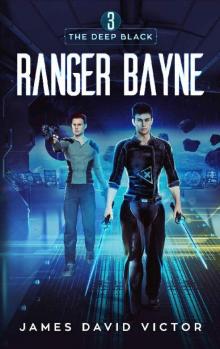 Ranger Bayne
Ranger Bayne Valyien Boxed Set 3
Valyien Boxed Set 3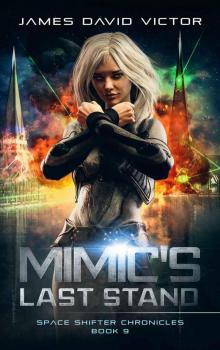 Mimic's Last Stand
Mimic's Last Stand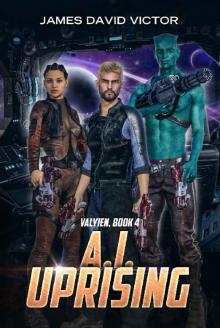 A. I. Uprising (Valyien Book 4)
A. I. Uprising (Valyien Book 4)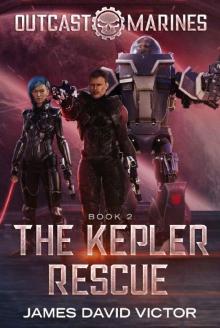 The Kepler Rescue
The Kepler Rescue Last Stand Boxed Set
Last Stand Boxed Set Challenge of Steel
Challenge of Steel Mimic Saves Her People
Mimic Saves Her People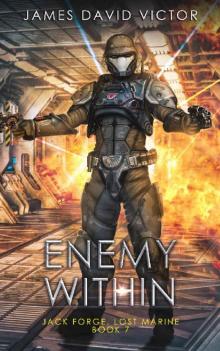 Enemy Within (Jack Forge, Lost Marine Book 7)
Enemy Within (Jack Forge, Lost Marine Book 7)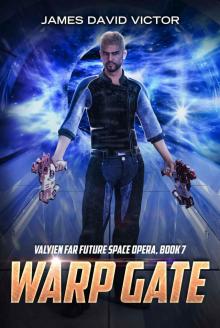 Warp Gate (Valyien Far Future Space Opera Book 7)
Warp Gate (Valyien Far Future Space Opera Book 7) A. I. Apocalypse (Valyien Far Future Space Opera Book 8)
A. I. Apocalypse (Valyien Far Future Space Opera Book 8) Captain Bayne Boxed Set
Captain Bayne Boxed Set Blue Star Marine Boxed Set
Blue Star Marine Boxed Set Night Raiders
Night Raiders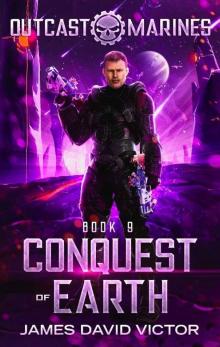 Conquest of Earth
Conquest of Earth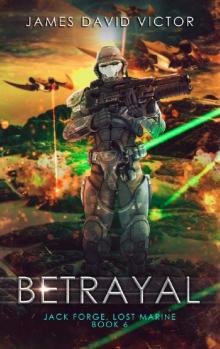 Betrayal (Jack Forge, Lost Marine Book 6)
Betrayal (Jack Forge, Lost Marine Book 6) Sharpe End
Sharpe End Parallax
Parallax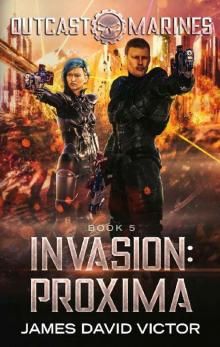 Invasion- Proxima
Invasion- Proxima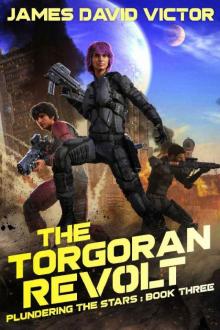 The Torgoran Revolt (Plundering the Stars Book 3)
The Torgoran Revolt (Plundering the Stars Book 3) Outcast Marines series Boxed Set 2
Outcast Marines series Boxed Set 2 Outcast Marines series Boxed Set
Outcast Marines series Boxed Set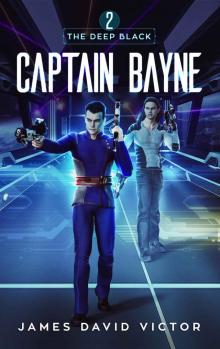 Captain Bayne
Captain Bayne Outcasts of Earth (Outcast Marines Book 1)
Outcasts of Earth (Outcast Marines Book 1)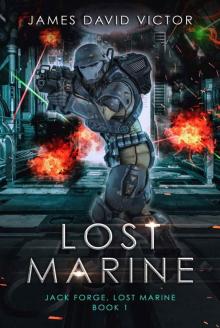 Lost Marine
Lost Marine Eternal Enemy
Eternal Enemy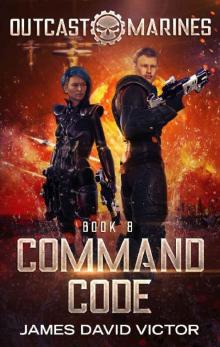 Command Code
Command Code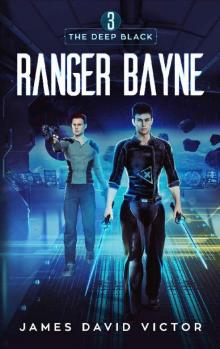 Ranger Bayne (The Deep Black Book 3)
Ranger Bayne (The Deep Black Book 3) Mimic: The Space Shifter Chronicles Boxed Set (Books 1 - 9)
Mimic: The Space Shifter Chronicles Boxed Set (Books 1 - 9) The Deep Black Space Opera Boxed Set
The Deep Black Space Opera Boxed Set Federation at War (Blue Star Marines Book 1)
Federation at War (Blue Star Marines Book 1)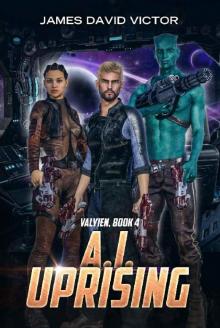 AI Uprising
AI Uprising The Xarren Escape (Plundering the Stars Book 2)
The Xarren Escape (Plundering the Stars Book 2) Valyien Boxed Set 1
Valyien Boxed Set 1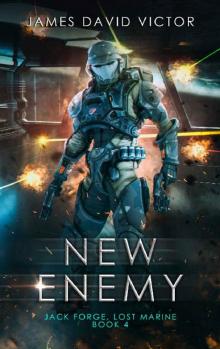 New Enemy (Jack Forge, Lost Marine Book 4)
New Enemy (Jack Forge, Lost Marine Book 4)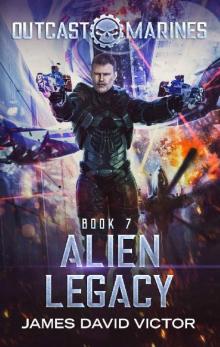 Alien Legacy
Alien Legacy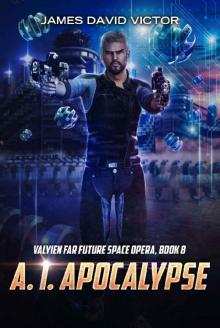 A I Apocalypse
A I Apocalypse Invasion (Blue Star Marines Book 3)
Invasion (Blue Star Marines Book 3)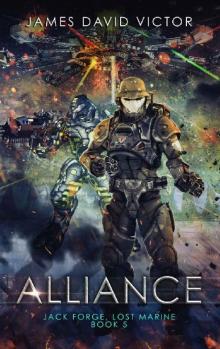 Alliance (Jack Forge, Lost Marine Book 5)
Alliance (Jack Forge, Lost Marine Book 5) Double Sharpe (Raven Sharpe Chronicles Book 2)
Double Sharpe (Raven Sharpe Chronicles Book 2) Metal Warrior: Steel Cage (Mech Fighter Book 6)
Metal Warrior: Steel Cage (Mech Fighter Book 6) Parallax (The Deep Black Book 1)
Parallax (The Deep Black Book 1)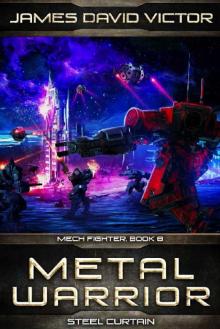 Metal Warrior: Steel Curtain (Mech Fighter Book 8)
Metal Warrior: Steel Curtain (Mech Fighter Book 8)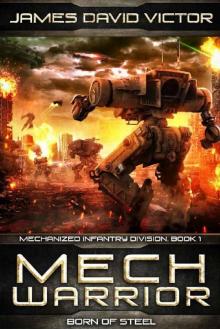 Mech Warrior: Born of Steel (Mechanized Infantry Division Book 1)
Mech Warrior: Born of Steel (Mechanized Infantry Division Book 1) Outcast Marines Boxed Set
Outcast Marines Boxed Set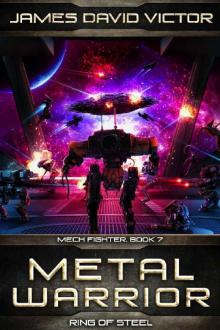 Metal Warrior: Ring of Steel (Mech Fighter Book 7)
Metal Warrior: Ring of Steel (Mech Fighter Book 7) The Elarri Heist (Plundering the Stars Book 1)
The Elarri Heist (Plundering the Stars Book 1)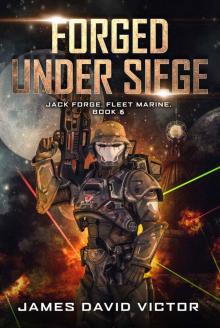 Forged Under Siege (Jack Forge, Fleet Marine Book 6)
Forged Under Siege (Jack Forge, Fleet Marine Book 6)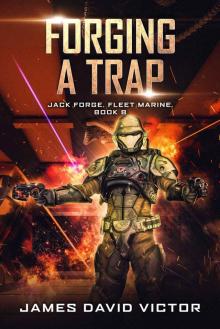 Forging a Trap (Jack Forge, Fleet Marine Book 8)
Forging a Trap (Jack Forge, Fleet Marine Book 8) Daikon (ESS Space Marines Book 2)
Daikon (ESS Space Marines Book 2) Mimic Changes the World
Mimic Changes the World Double Sharpe
Double Sharpe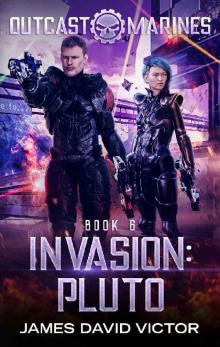 Invasion- Pluto
Invasion- Pluto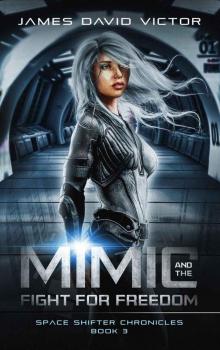 Mimic and the Fight for Freedom (Space Shifter Chronicles Book 3)
Mimic and the Fight for Freedom (Space Shifter Chronicles Book 3)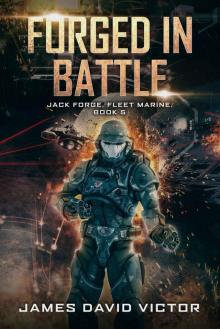 Forged in Battle (Jack Forge, Fleet Marine Book 5)
Forged in Battle (Jack Forge, Fleet Marine Book 5) Lykos (ESS Space Marines Book 6)
Lykos (ESS Space Marines Book 6) Metal Warrior: Precious Metal (Mech Fighter Book 5)
Metal Warrior: Precious Metal (Mech Fighter Book 5)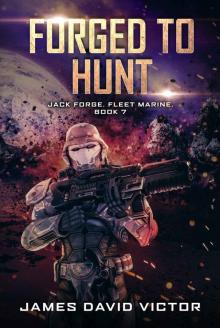 Forged to Hunt
Forged to Hunt Earth Space Service Space Marines Boxed Set
Earth Space Service Space Marines Boxed Set Alpha Rises
Alpha Rises Power of the Seers (Dragon Oracle Book 4)
Power of the Seers (Dragon Oracle Book 4)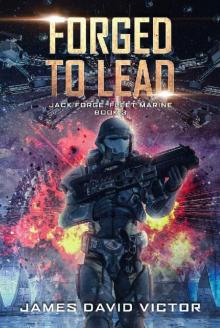 Forged to Lead (Jack Forge, Fleet Marine Book 3)
Forged to Lead (Jack Forge, Fleet Marine Book 3) Nebula (ESS Space Marines Book 4)
Nebula (ESS Space Marines Book 4)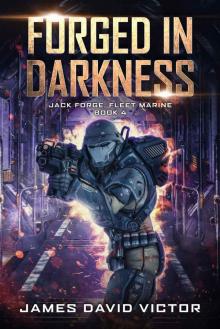 Forged in Darkness
Forged in Darkness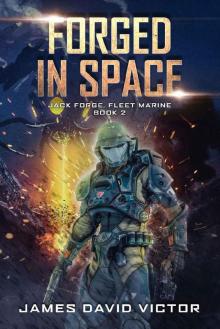 Forged in Space
Forged in Space Metal Warrior: Steel Trap (Mech Fighter Book 3)
Metal Warrior: Steel Trap (Mech Fighter Book 3) Mimic and the Space Engineer Boxed Set, Books 1 - 3
Mimic and the Space Engineer Boxed Set, Books 1 - 3 World Breaker Boxed Set (ESS Space Marines Omnibus Book 3)
World Breaker Boxed Set (ESS Space Marines Omnibus Book 3)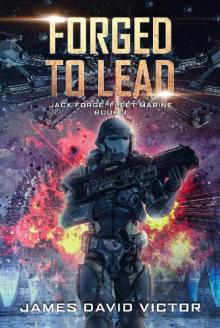 Forged to Lead
Forged to Lead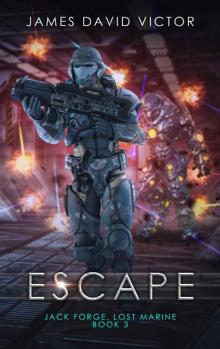 Escape (Jack Forge, Lost Marine Book 3)
Escape (Jack Forge, Lost Marine Book 3)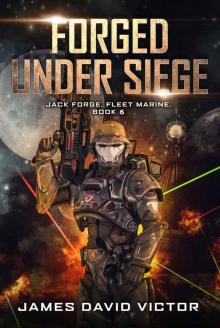 Forged Under Siege
Forged Under Siege Jack Forge, Fleet Marine Boxed Set (Books 1 - 9)
Jack Forge, Fleet Marine Boxed Set (Books 1 - 9)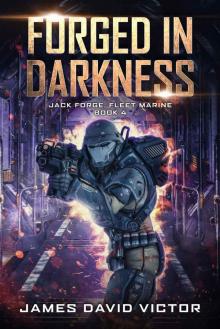 Forged in Darkness (Jack Forge, Fleet Marine Book 4)
Forged in Darkness (Jack Forge, Fleet Marine Book 4) Insurrection
Insurrection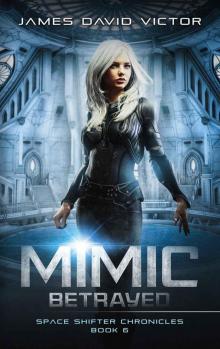 Mimic Betrayed (Space Shifter Chronicles Book 6)
Mimic Betrayed (Space Shifter Chronicles Book 6) Mimic Goes to War (Space Shifter Chronicles Book 5)
Mimic Goes to War (Space Shifter Chronicles Book 5)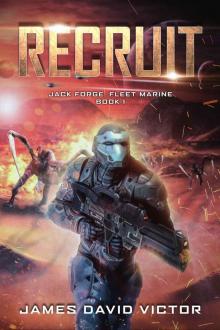 Recruit (Jack Forge, Fleet Marine Book 1)
Recruit (Jack Forge, Fleet Marine Book 1)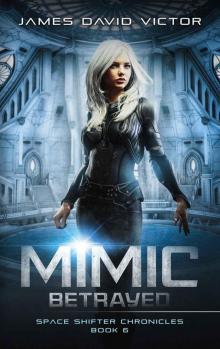 Mimic Betrayed
Mimic Betrayed Power of the Seers
Power of the Seers Mimic and the Journey Home (Space Shifter Chronicles Book 2)
Mimic and the Journey Home (Space Shifter Chronicles Book 2)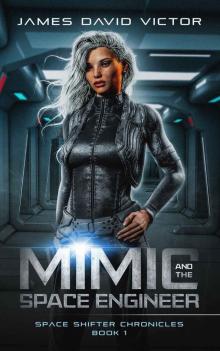 Mimic and the Space Engineer (Space Shifter Chronicles Book 1)
Mimic and the Space Engineer (Space Shifter Chronicles Book 1)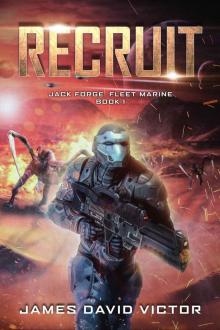 Recruit
Recruit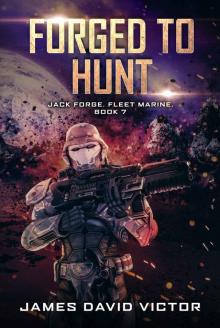 Forged to Hunt (Jack Forge, Fleet Marine Book 7)
Forged to Hunt (Jack Forge, Fleet Marine Book 7)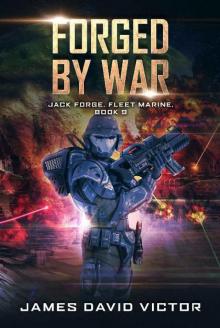 Forged by War (Jack Forge, Fleet Marine Book 9)
Forged by War (Jack Forge, Fleet Marine Book 9)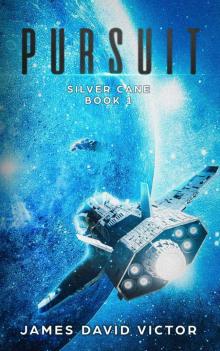 Pursuit (Silver Cane Book 1)
Pursuit (Silver Cane Book 1) Zenith (ESS Space Marines Book 1)
Zenith (ESS Space Marines Book 1) Star Chaser (ESS Space Marines Book 3)
Star Chaser (ESS Space Marines Book 3)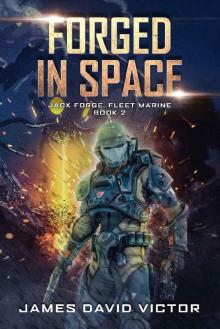 Forged in Space (Jack Forge, Fleet Marine Book 2)
Forged in Space (Jack Forge, Fleet Marine Book 2) Defense (Silver Cane Book 2)
Defense (Silver Cane Book 2) Infiltrate (Silver Cane Chronicles Book 3)
Infiltrate (Silver Cane Chronicles Book 3) Alpha Rises (Valyien Book 2)
Alpha Rises (Valyien Book 2) Mimic Raises an Army
Mimic Raises an Army Alien Evolution (Valyien Book 3)
Alien Evolution (Valyien Book 3) Arkana (ESS Space Marines Book 4)
Arkana (ESS Space Marines Book 4) Lykos
Lykos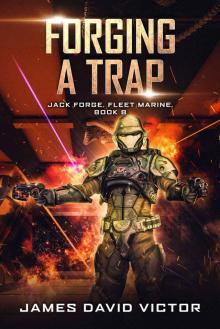 Forging a Trap
Forging a Trap Mimic Goes to War
Mimic Goes to War Earth Space Service Boxed Set: Books 1 - 3 (ESS Space Marines Omnibus)
Earth Space Service Boxed Set: Books 1 - 3 (ESS Space Marines Omnibus) Stranded (ESS Space Marines Book 7)
Stranded (ESS Space Marines Book 7) Mimic Raises an Army (Space Shifter Chronicles Book 4)
Mimic Raises an Army (Space Shifter Chronicles Book 4) Alien Evolution
Alien Evolution